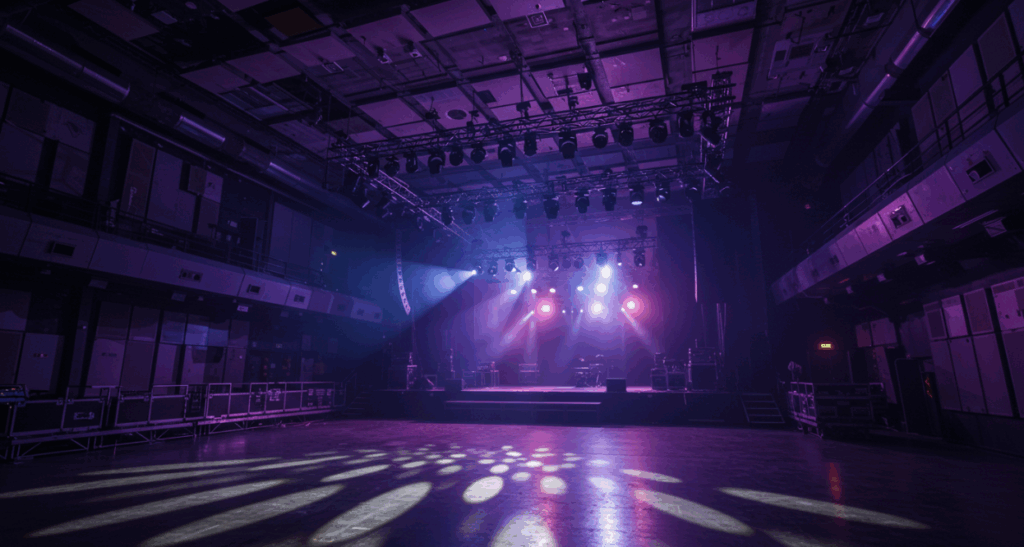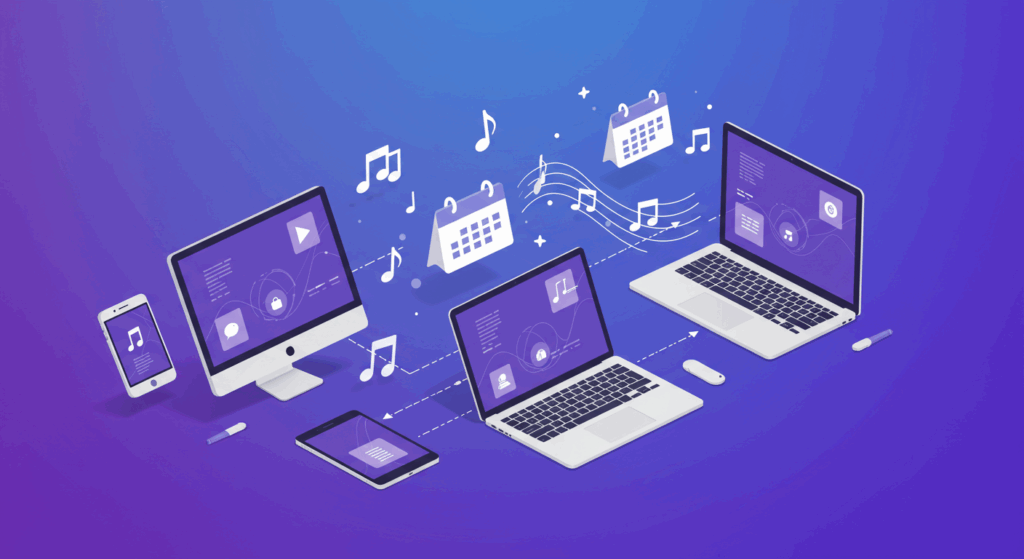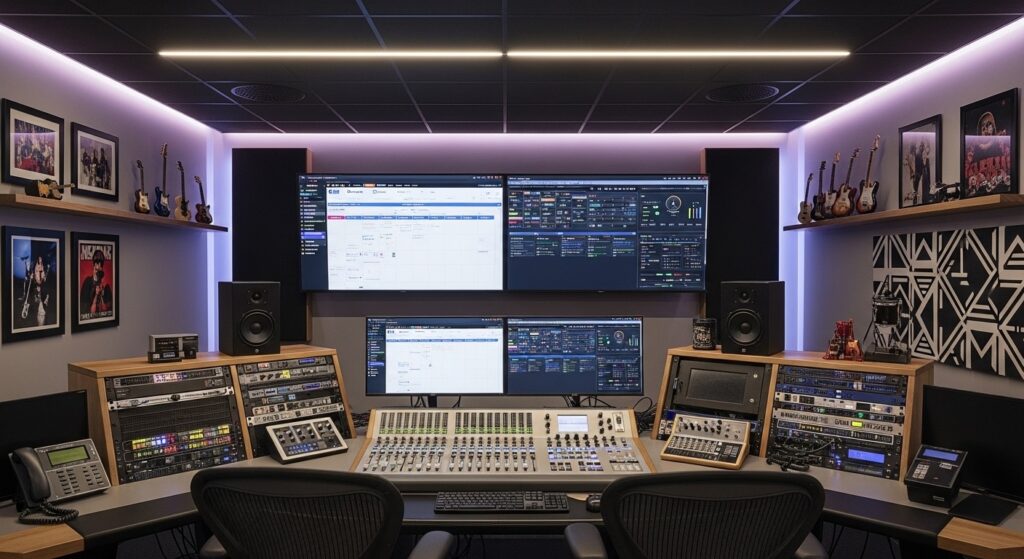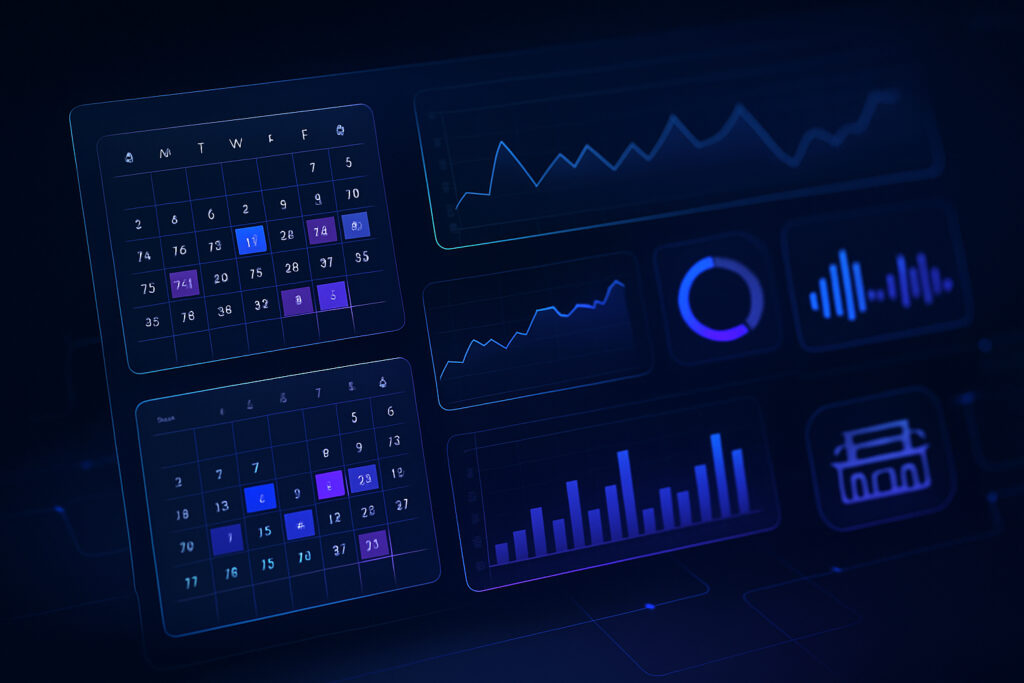
How to Choose the Right Music Venue Booking Software
Modern music venues need sophisticated booking systems to compete in the industry.
- Advanced platforms now offer AI automation, real-time ticketing integration, and co-promotion management
- Music-specific software outperforms generic event platforms for venue profitability and efficiency
- The right system can save venue managers hours monthly while increasing booking accuracy
Choose specialized music venue software over enterprise solutions for better ROI and user experience.
How is your music venue currently handling the booking process? Some venues still use an old-fashioned approach involving handwritten notes, paper calendars, spreadsheets, and a lot of luck. While those tried-and-true methods might have worked in a bygone era, today’s music industry is more complicated and requires a sophisticated approach to daily operations.
Modern music professionals are embracing the digital frontier, moving away from traditional paper-based systems and looking for ways to streamline their booking systems. It’s time to put the pen and paper away and embrace purpose-built software for the live music industry. In other words, it’s time to find the right music venue booking software for your stage.
Whether you’re a music venue owner or artist promoter, venue booking systems can help optimize your operations, manage shows more efficiently, and increase your business’s productivity.
What is Music Venue Booking Software?
Music venue booking software gives artists, managers, and promoters a central platform to manage all the moving parts of running a music business. From calendars to contracts, settlements to sign-offs, users can stay on the same page regarding upcoming dates, responsibilities, to-do lists, and more. When operating without the right booking software, venues can become disorganized and prone to error, leading to miscommunication, missed opportunities, and lost revenue.
The best concert management software consolidates all of your tools, processes, and responsibilities into one platform and enables you to share music-essential data with anyone on your team. Handle everything from coordinating suitable dates on shared calendars to settling the final payouts among artists. A digital booking platform can make collaborating and sharing information easier for everyone in your network.
Modern venue booking systems have evolved beyond simple scheduling tools. The global event management software market was valued at $8.4 billion in 2024 and is expected to reach $17.33 billion by 2030, with music-specific platforms seeing the fastest growth rates.
Why Should Music Venues Choose Specialized Software Over Generic Platforms?
Generic event management platforms might work for wedding planners or corporate gatherings, but they fall short when dealing with the unique complexities of live music. Venues need software that understands artist contracts, co-promotion deals, merchandise splits, and the fast-paced nature of tour booking.
Music-specific platforms offer specialized features that generic systems can’t match. These capabilities include integrated ticketing partnerships, artist database connections, and settlement tools designed specifically for the music industry’s unique revenue-sharing models.
What Are the Must-Have Features of Music Venue Booking Software?
Ready to supercharge the efficiency of your music venue and go digital? Here are the 10 essential features to look for when searching for concert management software and some expert tips on making the most of your new tool.
Feature #1: Start-to-Finish Booking Management
Anyone in the business understands that effective booking involves much more than putting a name on a calendar. Successful venue booking involves a lot of people, moving dates and schedules, crucial contracts, and financial negotiations. Doing all that work manually is enough to send anyone’s head spinning.
The right venue booking software can help you organize and manage all those moving parts. From initial hold through final settlement, effective venue software should give you a central platform to manage all aspects of booking management while helping you eliminate costly redundancies and improving your team’s communication.
Look for software that offers comprehensive features for venue booking management, from calendars to payments and final reporting.
Feature #2: AI-Powered Automation Features
Modern venue booking systems now incorporate artificial intelligence to streamline repetitive tasks. Smart automation can handle routine follow-ups, generate personalized offer templates, and predict optimal pricing based on historical data and market trends. AI technologies can automate 60-70% of work activities, reducing manual admin tasks.
Look for systems that can automatically send booking confirmations, generate contracts with pre-filled details, and provide intelligent scheduling suggestions based on your venue’s booking patterns.
Feature #3: Comprehensive Customization Options
No out-of-the-box software package will be exactly what you need from the start. But great software can adapt to your venue’s workflow and become a perfect-fit solution with its customizable options.
Look for platforms that let you precisely manage important aspects, such as how you communicate with your team, when you send out reminders, or how you navigate your calendar. It’s even better if you can incorporate your venue’s branding into reporting, emails, advances, and more.
Feature #4: Advanced Integration Capabilities
Most music professionals have embraced the digital landscape, so music venue booking software probably won’t be the only tool in your tech stack. It’s great if your chosen software plays nicely with the other apps and platforms you use. That might include integrating with your team’s Google calendar, linking communications to your work email, and quickly grabbing data from your preferred ticketing source.
These tech integrations make it a lot easier to share information among your team and other platforms you use. You can eliminate a lot of manual data entry and save time for more significant projects (or, dare we say it, even taking a fifteen-minute break for once).
Feature #5: Mobile-First Accessibility
It’s rare to meet a music venue manager who works exclusively from their office. Many music professionals are taking calls from producers, artists, and promotions teams at all hours of the day (and sometimes the night). They’re often on the go, working from their phones while they grab lunch, scout talent, or pick the kids up from school. Only modern music venue booking software can keep up with such busy schedules.

Look for mobile-friendly software so you can access information from wherever the industry takes you. Succeeding in the music world is all about agility and being able to pivot at the right moment. Cloud-based platforms should make it easy to log in from anywhere, so you can focus on building important relationships while having all your professional tools at your fingertips.
Feature #6: Co-Promotion and Partnership Management
One feature that sets music venue software apart from generic event platforms is sophisticated co-promotion management. Co-promotion deals are increasingly common in the music industry, where venues partner with promoters or other venues to share risks and profits.
Advanced venue booking systems now include dedicated co-promotion modules that can automatically calculate profit splits, track partner contributions, and generate settlement reports for multiple parties. This feature alone can save venues hundreds of hours annually on complex financial calculations.
Feature #7: Real-Time Analytics and Reporting
The work doesn’t stop when the final song ends. Post-show reporting and analytics represent some of the most vital aspects of venue management. Understanding final payout numbers, measuring marketing effectiveness, and extracting insights to improve future events are all essential for long-term success.
The right music venue software can give you insight into these aspects of management and so much more. Look for software that offers plenty of reporting and analytics features so you can pull data about shows and make informed decisions for future optimization opportunities. Modern platforms provide real-time dashboards showing ticket sales, revenue projections, and capacity utilization.
Feature #8: Smart Permission and Access Control
Running a music venue requires a full team effort. You have event staff, promotions teams, concessions managers, maintenance staff, and other experts who also need the latest details on what’s happening and when. However, not everyone requires the same level of access to sensitive information, and certain aspects should remain confidential to key personnel.
Look for booking software that allows you to control who has access to what information. Permissions and access control should be easy to tweak and simplify, giving the right people the information required to do their jobs.
Feature #9: Integrated Ticketing and Sales Tracking
Modern venue booking systems should seamlessly connect with major ticketing platforms to provide real-time sales data. This integration allows you to monitor ticket sales progress, adjust marketing strategies mid-campaign, and make informed decisions about additional show announcements.
The best systems offer automated ticket count tracking, eliminating the manual process of collecting sales reports from multiple sources. This feature is particularly valuable for venues managing multiple shows simultaneously.
Feature #10: Budget-Friendly and Scalable Pricing
Live music venues face significant financial pressures and tight profit margins. The software you choose should help make your operations more efficient and thus boost your bottom line. However, it only makes sense to select software with budget-friendly pricing that isn’t going to break the bank.
Some software packages will come for a flat fee, while others might use a monthly or annual subscription model. Make sure you understand the total cost of using the software before you make any commitments. If the software offers free trials or demos, take advantage of these offers to get a better feel for it before you sign any contracts.
Which Type of Venue Booking Software Should You Choose?
| Feature | Music-Specific (Prism) | Generic Event (Perfect Venue) | Enterprise (EventBooking.com) |
| Pricing | Mid-range | Affordable | Premium |
| Setup Time | Quick | Moderate | Extended |
| Artist Database | Integrated | None | Basic |
| Co-Promotion Tools | Advanced | None | Limited |
| Ticket Integration | Multiple platforms | Basic | Multiple platforms |
| Mobile Optimization | Excellent | Good | Limited |
| Industry Customization | Music-focused | Generic | Multi-industry |
| Learning Curve | Moderate | Easy | Complex |
| Best For | Music venues, promoters | Small event venues | Large enterprises, convention centers |
How Does Prism Compare to EventBooking.com?
While EventBooking.com (now part of Momentus Technologies) offers a comprehensive enterprise solution, it’s designed primarily for large convention centers, arenas, and multi-purpose facilities. Their platform excels at managing massive events with complex logistics but often proves overwhelming and overpriced for independent music venues.
EventBooking.com’s enterprise focus means lengthy implementation periods, extensive training requirements, and pricing structures that can strain smaller venue budgets. Their system handles corporate events and large-scale conferences beautifully but lacks the music industry-specific features that venues truly need.
In contrast, Prism’s specialized approach means faster setup, intuitive interfaces designed specifically for music professionals, and features like co-promotion management that don’t exist in generic enterprise platforms. Music venues get better value, faster implementation, and tools actually built for their daily workflows.
What Are the Latest Trends in Venue Booking Software?
Venue management software continues evolving. Current trends shaping the industry include:
AI-Driven Insights: Modern platforms now use machine learning to predict optimal show scheduling, suggest pricing strategies, and identify booking opportunities based on historical data and market trends.
Sustainability Features: Environmental consciousness is growing in the music industry, with new software modules tracking carbon footprints, waste management, and sustainable practices.
Enhanced Fan Engagement: Integration with social media platforms and fan databases helps venues better understand their audience and create targeted marketing campaigns.
Contactless Operations: Modern preferences have accelerated the adoption of contactless check-in, digital contracts, and remote collaboration features.
How Can Music Venue Booking Software Boost Your Performance?
When specifically designed for music venues, booking software transforms from a simple tool into a strategic advantage for managing more shows with greater precision and less administrative overhead. Advanced concert management software makes revenue tracking and break-even analysis straightforward, enabling smarter marketing decisions and faster pivots when needed.
The key differentiator lies in end-to-end integration. Users can manage availability calendars and instantly share updates with stakeholders who need access. Advanced systems generate detailed offers within seconds, providing comprehensive breakdowns while tracking revenues and expenses as they occur. Premium platforms connect directly with ticketing services, delivering real-time insights into how sales impact profitability.
Modern venue booking systems save successful venues time through automation and streamlined workflows. These savings translate directly into increased booking capacity and higher profit margins.
Frequently Asked Questions
What’s the difference between music venue booking software and general event management platforms? Music venue booking software includes specialized features like artist database integration, co-promotion management, and music industry-specific contract templates that general event platforms lack.
How long does it typically take to implement a new venue booking system? Music-specific platforms typically require one to two weeks for full implementation, while enterprise solutions can take months.
Can venue booking software integrate with existing ticketing platforms? Yes, modern music venue software integrates with major ticketing platforms, including Eventbrite, Ticketmaster, and specialized music ticketing services, to provide real-time sales data.
What ROI can I expect from investing in venue booking software? Most venues see ROI within three to six months through time savings, reduced booking errors, and improved capacity utilization. Venues can save significant time monthly on administrative tasks.
Ready to Transform Your Venue Operations?
Now is the time to embrace a new digital solution for your music venue booking needs. The competition is fierce, fan expectations are higher than ever, and operational efficiency can make the difference between thriving and merely surviving in today’s music industry.
Prism offers an all-in-one solution designed specifically for the music industry. Our platform combines the booking management tools you need with the music industry expertise you deserve. From artist booking automation to co-promotion settlement tracking, we’ve built everything with music venues in mind. Get started with Prism today and discover why music industry professionals trust us to power their most successful shows.

Matt Ford is the founder and CEO of Prism.fm, an Austin-based software company revolutionizing live music event management. With a background in entrepreneurship and a degree from the University of Wisconsin-Madison School of Business, Ford combined his self-taught coding skills with firsthand experience as a concert promoter to address the inefficiencies he observed in the industry. In 2018, he launched Prism.fm, an all-in-one platform designed to streamline operations for venues, promoters, and agencies by replacing cumbersome spreadsheets with integrated tools for booking, financial tracking, and contract management. Under his leadership, Prism.fm has grown significantly, achieving $3 million in annual recurring revenue post-COVID and securing over $15 million in funding . Ford’s commitment to building user-centric solutions has positioned Prism.fm as a trusted partner for over 1,500 venues and promoters worldwide.



